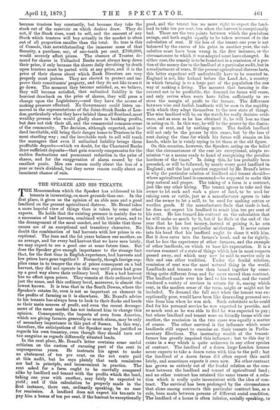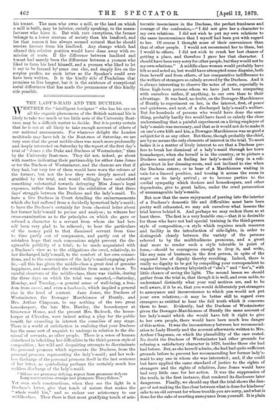THE SPEAKER AND HIS TENANTS. T HE Memorandum which the Speaker
has addressed to his tenants is interesting, on more grounds than one. In the first place, it gives us the opinion of an able man and a good landlord on the present agricultural distress. Mr. Brand takes a more hopeful view of things than is taken by some other experts. He holds that the existing pressure is mainly due to a succession of bad harvests, combined with low prices, and to the derangement of the meat market, and he thinks that these causes are of an exceptional and transitory character. No doubt the combination of bad harvests with low prices is ex- ceptional. The lean and the fat years balance one another, on an average, and for every bad harvest that we have seen lately, we may expect to see a good one at some future time. But does the Speaker give enough importance to the strange fact that, for the first time in English experience, bad harvests and low prices have gone together Formerly, though foreign sup- plies came in to temper the rise of prices consequent on a bad harvest, they did not operate in this way until prices had gone up a good way above their ordinary level. Now a bad harvest has no effect upon prices. They remain at their ordinary level just the same, and this ordinary level, moreover, is almost the lowest known. It is true that in the South Downs, where the Speaker's estates lie, corn is not so important an element in the profits of farming as it is elsewhere. Mr. Brand's advice to his tenants has always been to look to their flocks and herds as their main sources of profit, and even the recent derange- ment of the meat market has not induced him to change this opinion. Consequently, the imports of corn from America, which are giving farmers generally so much alarm, may be only of secondary importance in this part of Sussex. In this way, therefore, the anticipations of the Speaker may be justified as regards his own tenantry, even though they should turn out too sanguine as regards differently situated lands. .Inthe next place, Mr. Brand's letter contains some useful criticism on the custom of excusing part of the rent in nnprosperous years. He instructs his agent to make an abatement of ten per cent, on the net rents paid at this audit, but he says plainly that such remissions are bad in principle, and inconvenient in practice. The rent asked for a farm ought to be carefully compared alike by landlord and tenant with the profits which the land, taking one year with another, may fairly be expected to yield ; and if this calculation be properly made in the first instance, there can, ordinarily speaking, be no case for remission. A landlord does not expect his ten ants to pay him a bonus of ten per cent, if the harvest be exceptionally good, and the tenant has no more right to expect the land- lord to take ten per cent, less when the harvest is exceptionally bad. These are the two points between which the pendulum swings, and both ought equally to be taken account of in the calculation of rent. If the loss of the tenant one year is not balanced by the excess of his gains in another year, the cal- culation must have been wrong in the first instance, or the circumstances to which it was adapted must have changed. In either case, the remedy is to be found not in a remission of a por- tion of the money due to the landlord at a particular audit, but in a readjustment of rents. If the present agricultural distress lasts, this latter expedient will undoubtedly have to be resorted to. England is not, like Ireland before the Land Act, a country in which farming is to a large part of the population the one way of making a living. The moment that farming is dis- covered not to be profitable, the demand for farms will cease, and only revive when rents have fallen sufficiently to re- store the margin of profit to the farmer. The difference between wise and foolish landlords will be seen in the rapidity with which they adapt themselves to the new state of things. The wise landlord will be on the watch for really decisive evid- ence, and as soon as he has obtained it, he will lose no time in acting on it. In this way, he will be the poorer by the dimin- ution of rent, and by nothing more. The foolish landlord will not only be the poorer by this cause, but by the loss of rent during the time for which his farms will remain on his hands, while he is vainly trying to let them at the old figure.
On this occasion, however, the Speaker, acting on the belief that the circumstances of the case are exceptional, adopts re- mission "as a means ready to hand of recognising the peculiar hardness of the times." In doing this, he has probably been preceded, or will be followed, by nearly every good landlord in England ; and the last question suggested by Mr. Brand's letter is why the particular relation of landlord and tenant should— where agricultural land is concerned—be supposed to make this step natural and proper. The taking of a farm is a contract, just like any other hiring. The tenant agrees to take and the owner to let such and such a piece of land, to be used for raising corn or cattle, just as a manufacturer agrees to take and the owner to let a mill, to be used for making cotton or woollen goods. If the manufacturer finds that trade is bad, he does not expect his landlord to remit him ten per cent of his rent. He has framed his contract on the calculation that he will make so much by it, but if he finds at the end of the year that he has lost money, instead of gaining it, he sets this down as his own particular misfortune. It never enters into his head that his landlord ought to share it with him. But it does enter into the farmer's head, and so far rightly, that he has the experience of other farmers, and the example of other landlords, on which to base his expectation. It is a curious remnant of a state of things which has in most respects passed away, and which may now be said to survive only in this and one other tradition. Under the feudal relation, remission of rent was the most natural thing in the world. Landlords and tenants were then bound together by some- thing quite different from and far more sacred than contract. The landlord made over his land to his vassal, and the vassal rendered a variety of services in return for it, among which rent, in the modern sense of the term, might or might not be included. To demand the full rent when the tenant was ex- ceptionally poor, would have been like demanding personal ser- vice from him when he was sick. Such substitute as he could find for his personal service he was expected to provide, and so much rent as he was able to find he was expected to pay ; but where landlord and tenant were on friendly terms with one another, the remission in the two cases was equally a matter of course. The other survival is the influence which some landlords still expect to exercise on their tenants in Parlia- mentary Elections. The increasing wealth of the tenant- farmer has greatly impaired this influence ; but to this day it exists in a way which is quite unknown in any other species of contract. The landlord of a dozen large London houses never expects to take a dozen votes with him to the poll ; but the landlord of a dozen farms did often expect this until lately, and sometimes expects it even now. No other contract has grown so entirely out of the feudal relation as the con- tract between the landlord and tenant of agricultural land ; and no other contract has retained the same traces of a rela- tion which is really quite inconsistent with the idea of con- tract. The survival has been prolonged by the circumstance that alone among contracts this particular contract has, as a rule, been made between persons of different social condition. The landlord of a house is often inferior, socially speaking, to
his tenant. The man who owns a mill, or the land on which a mill is built, may be inferior, socially speaking, to the manu- facturer who hires it. But with rare exceptions, the farmer belongs to a lower stratum of society than his landlord, and for that reason it has always seemed natural that he should receive favours from his landlord. Any change which had altered this relative position would have done away with re- mission of rents. If the difference between landlord and tenant had merely been the difference between a yeoman who liked to farm his land himself, and a yeoman who liked to let it out to be farmed by' some one else, and simply live on the surplus profits, no such letter as the Speaker's could ever have been written. It is the kindly side of Feudalism that promises to live longest, but it is the existence of exceptional social differences that has made the permanence of this kindly side possible.



































 Previous page
Previous page